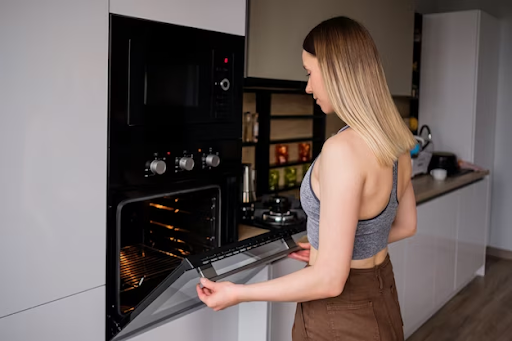
When it comes to choosing a cooktop for your home kitchen, many are faced with the question: what is the difference between an induction cooktop and an electric cooktop, which is better? The main difference between these types is the heating method and energy efficiency. Electric panels rely on heating coils or heating elements that transfer heat to the bottom of the pot or pan. Unlike electric panels, induction panels operate using a magnetic field that heats the cookware, making cooking faster and more economical.
Operation principle and design
Electric hobs
< p>Based on the principle of direct heat transfer, electric hobs come in both traditional spirals and glass-ceramic hobs with built-in heating elements. Their key features are simplicity and reliability. However, when assessing the difference between an electric and an induction hob, it should be noted that there is higher energy consumption and a slower response to changes in temperature level.
- Electric hob with spirals:
- Simplicity of design.
- Electric hob with spirals:
- Simple design.
- Economical to purchase.
- High heating capacity.
- Glass-ceramic panel:
- Modern appearance.
- Easy to clean.
- Even heat distribution.
While these panels have their advantages than An induction cooktop is different from an electric cooktop – it is a more modern heating technology that provides different levels of speed and control over the cooking process.
Induction cooktops
Induction cooktops are a fundamentally different technology, where coils are located under the glass-ceramic surface. When turned on, they create a magnetic field that interacts with the metal at the bottom of the cookware, causing it to heat up. The result is high heating rates and extremely precise temperature control, making induction cookers the preferred choice for those who value cooking time and quality.
< td>More efficientPanel Type Heating speed Adjustment accuracy Energy efficiency Electric High Medium Less efficient Induction Very high High What is the difference between an electric and induction hob in terms of energy efficiency? Induction cooktops heat cookware directly, minimizing heat loss and reducing energy consumption.
Energy efficiency and heat control
Managing energy costs and environmental impact are two significant factors to consider when choosing hob. Induction hobs are superior to electric ones due to their higher energy efficiency and their ability to precisely adjust temperature.
- Induction hobs only consume energy when cookware is on them.
- Electric panels, in in turn, heat the surface itself, which leads to additional energy costs.
Thanks to the accuracy and speed of temperature adjustment, induction cookers are an excellent tool for those cooks who value speed and control during the cooking process variety of dishes.
Safety and ease of use
In the context of a home kitchen, safety is one of the most important criteria when selecting kitchen equipment. Electrical panels, although they carry a potential risk of burns, especially in families with small children, nevertheless have a certain level of safety due to the use of automation and protection against overheating. Induction panels are much safer in this regard, since they heat only the bottom of the cookware, and not the entire surface of the stove, which significantly reduces the risk of unexpected injuries.
- Safe characteristics:
- Automatic shutdown when there are no dishes.
- Overheat protection.
- Child lock function.
In addition to safety, ease of maintenance and use also comes to the fore. Glass-ceramic electric panels are easy to clean from dirt, but when using induction panels, this process is even simplified, since the surface practically does not heat up and remains cool around the cookware.
Cookware compatibility
Choice between induction and the electrical panel will also affect the selection of kitchen utensils. Suitable cookware for an induction hob must be ferromagnetic, which means using pans and pots with bottoms made of ferromagnetic materials. This may limit the use of some cookware you already have in the kitchen.
- Induction cookware:
- Contains iron or steel.
- Has a flat surface bottom for maximum contact.
- Cookware for electric stoves:
- Almost any materials except aluminum and copper (for glass-ceramic surfaces).
Conclusion: How to choose the right cooktop
The final choice between an electric and induction cooktop depends on many factors, including individual preferences, budget, cooking style and kitchen dishes High energy efficiency and fast heating make induction cookers an attractive choice for energy-conscious consumers and those who value time. At the same time, traditional electric stoves continue to be a popular and affordable option.
The final decision should be made taking into account the pros and cons, and possibly experience with both types of panels. Each type of stove has its own set of characteristics, which may be ideal for one person and not at all suitable for another.
Frequently asked questions
Question:: Is it possible to use ordinary cookware on induction cooker?
An induction cooker requires special cookware with a ferromagnetic bottom. If the cookware does not meet these requirements, it will not heat up.
Question: Are the costs of purchasing an electric and induction cooker much different?
Induction cookers are usually more expensive electric due to more modern technology and high energy efficiency.
Question: Does an induction hob require special care?
Induction hobs are easy to clean and do not require special care; it is enough to wipe the surface with a damp cloth after use.
Question: How quickly does an induction cooker heat cookware compared to an electric cooker?
Induction cookers heat cookware much faster than electric, thanks to the direct production of heat in the cookware.
Question: Can an induction cooker be used with automatic temperature control devices?
Yes, many induction cookers are equipped with automatic control function, which allows you to maintain the set temperature without manual intervention.
- Electric hob with spirals:
- Simplicity of design.




